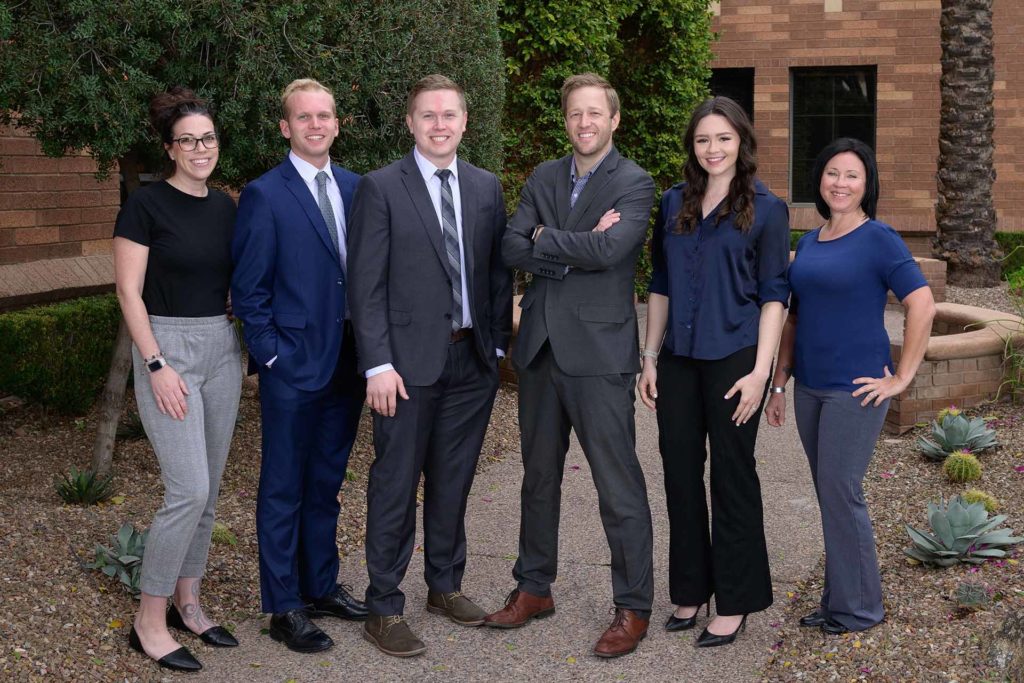Our experienced legal team can help you set up a guardianship for a loved one.
Establishing an Arizona guardianship can be complicated, and a guardianship attorney can be quite helpful with everything that is involved. The process generally begins when a family member or friend petitions the court to appoint a guardian for somebody for whom they are concerned, such as an adult with mental illness. Upon receiving the petition, the court appoints an attorney to represent the proposed ward and schedules a hearing on the matter, where it will consider all of the relevant guardianship information.
Types of Guardianships We Offer
Generally speaking, a guardianship authorizes an individual or agency to legally act on behalf of an incapacitated adult (known as a ward in guardianship proceedings). Within that broad definition, there are several different types of guardianships that allow the court to tailor the scope of the guardianship to the specific, unique needs of the ward:
General Guardianship
This is general guardianship which grants a guardian the authority to make decisions regarding the ward’s healthcare and living arrangements.
Limited Guardianship
In some cases, the court may determine that the ward is only partially incapacitated. For example, the ward may possess the mental faculties to make important healthcare decisions, but they need someone to handle their finances and living arrangements. Alternatively, the ward may be competent enough to handle their general finances but requires assistance in specific complicated transactions like selling real estate. If the ward isn’t incapacitated enough to warrant a plenary guardianship, the court will utilize a limited guardianship instead.
Emergency Guardianship
In emergency situations where the ward is in imminent danger of death or serious bodily harm, the court can appoint an emergency guardian for up to six days. While the process is expedited, the petitioner will still need to prove that the ward is incapacitated and that an emergency guardianship is necessary. If the ward still needs a guardian after six days, the court can extend the emergency guardianship into a temporary guardianship.
Temporary Guardianship
Similar to an emergency guardianship, a temporary guardian can be appointed for up to 60 days. If the ward still needs a guardian after 60 days and the formal guardianship proceedings haven’t successfully concluded, the court can extend the temporary guardianship when necessary.
Successor Guardianship
When an appointed guardian passes away or can no longer fulfill their duty of care to the ward, the court can appoint a successor guardian.
Testamentary Guardianship
Testamentary guardianship typically occurs when a parent designates a guardian for their minor children in his or her will.
Who can be Appointed as a Guardian
Although any individual or agency can serve as a court-appointed guardian, the ward’s spouse, adult children, parents, and siblings have priority (typically in that order). It’s up to the judge to determine who is best qualified to serve as a ward’s guardian. In rare situations where the judge is unable to find a family member who is qualified, willing, and able to serve as the ward’s guardian, the judge can appoint a professional or public guardian.
Process of Guardian Appointment in Arizona
While people can seek a guardianship without the help of an attorney, a guardianship attorney may be helpful when it comes time for the guardianship hearing. A court investigator prepares for the hearing by interviewing family members and friends. The court also requests a physician’s report regarding capacity issues and the need for a guardianship. On the day of the hearing, the court examines the guardianship paperwork, considers all of the relevant testimony, and appoints a guardian, if appropriate. With the exception of certain medical emergencies, this entire process takes about eight weeks.
Alternatives to Guardianships
Guardianships are generally reserved for people who have not appointed somebody to handle their medical decisions. Those who plan in advance, however, can choose for themselves who will handle their medical decisions, and can significantly reduce the likelihood that they will ever require a guardian’s assistance. Legal tools are available, which, if used properly, can serve as alternatives to Arizona guardianships:
Health Care Power of Attorney
A health care power of attorney allows an individual (called a principal) to designate an agent who can make health care decisions in the event that he or she loses capacity to do so. Principals can revoke or change a power of attorney at any time, so long as they have capacity. To be valid, an Arizona health care power of attorney must:
- Clearly delegate the power to make health care decisions to a specific person;
- Be signed by a principal who is of sound mind and free from duress; and
- Be witnessed by at least one adult who is not the agent, relative or heir to the principal, or directly involved in providing health care to the principal.
Mental Healthcare Power of Attorney
Individuals can designate the same person or somebody else to make their mental health care decisions by creating a mental health care power of attorney. An agent must have this type of power of attorney to admit a principal for inpatient mental health treatment without court proceedings. An Arizona mental health care power of attorney can either be entirely separate from the health care power of attorney, or incorporated into the regular health care power of attorney so that one document covers both medical and mental health issues.
Surrogates
Arizona law allows what is referred to as a surrogate to make decisions for a person who does not have powers of attorney or an appointed guardian. While surrogates can obtain ordinary health care for the person under their stewardship, they cannot withdraw life-sustaining treatment, and ordinarily cannot consent to inpatient mental health care. The law gives priority to the following persons in the order given to act as a surrogate:
- The person’s spouse.
- The person’s child.
- The person’s parent.
- The person’s domestic partner, if the person is unmarried and nobody else has accepted financial responsibility.
- One of the person’s siblings.
- A close friend of the person who knows the person’s health care wishes.
- The person’s attending physician, if nobody else can be located.
Living Wills
A living will is yet another tool people can use to make their health care decisions known to others. Arizona living wills can be either specific or general. For example some living wills simply proscribe life-sustaining treatment. Other living wills are far more specific, and provide detailed instructions on pain relief, antibiotics, hydration, feeding, and the use of ventilators or cardiopulmonary resuscitation. A thorough living will that outlines important health care decisions in advance can many times preclude the need for a guardianship.
You Can Trust Our Team For Guardianship Services in Arizona
When you are ready to get the guardianship process started, our team — led by Attorney Colton Johnson— is here to guide the process. The JacksonWhite Guardianship and Conservatorship team of attorneys, paralegals, and legal assistants has helped hundreds of families navigate this often daunting procedure. Contact us below and our dedicated team will help your family move in the right direction.
Call our Guardianship and Conservatorship team at (480)467-4313 to discuss your case today.




